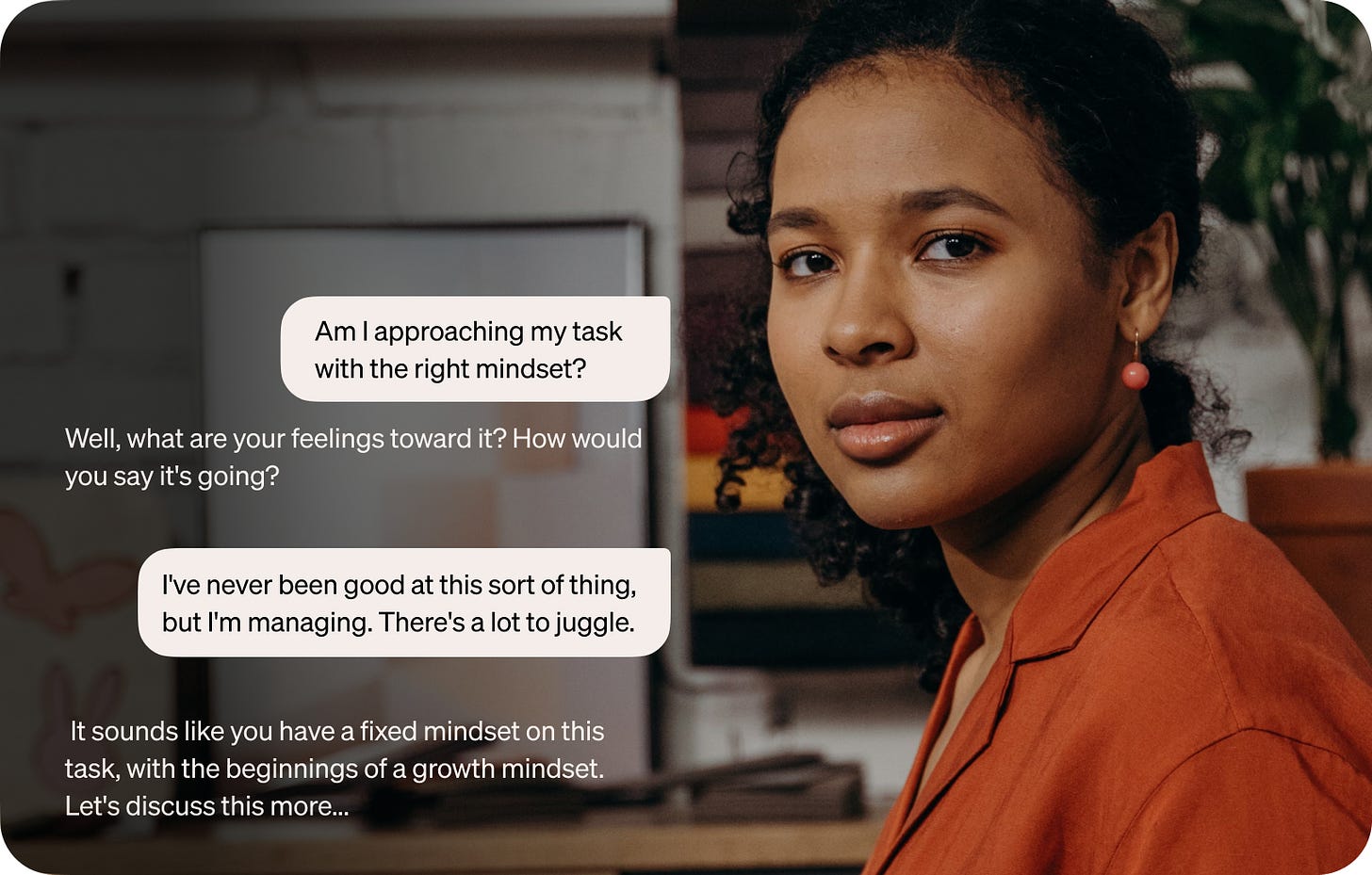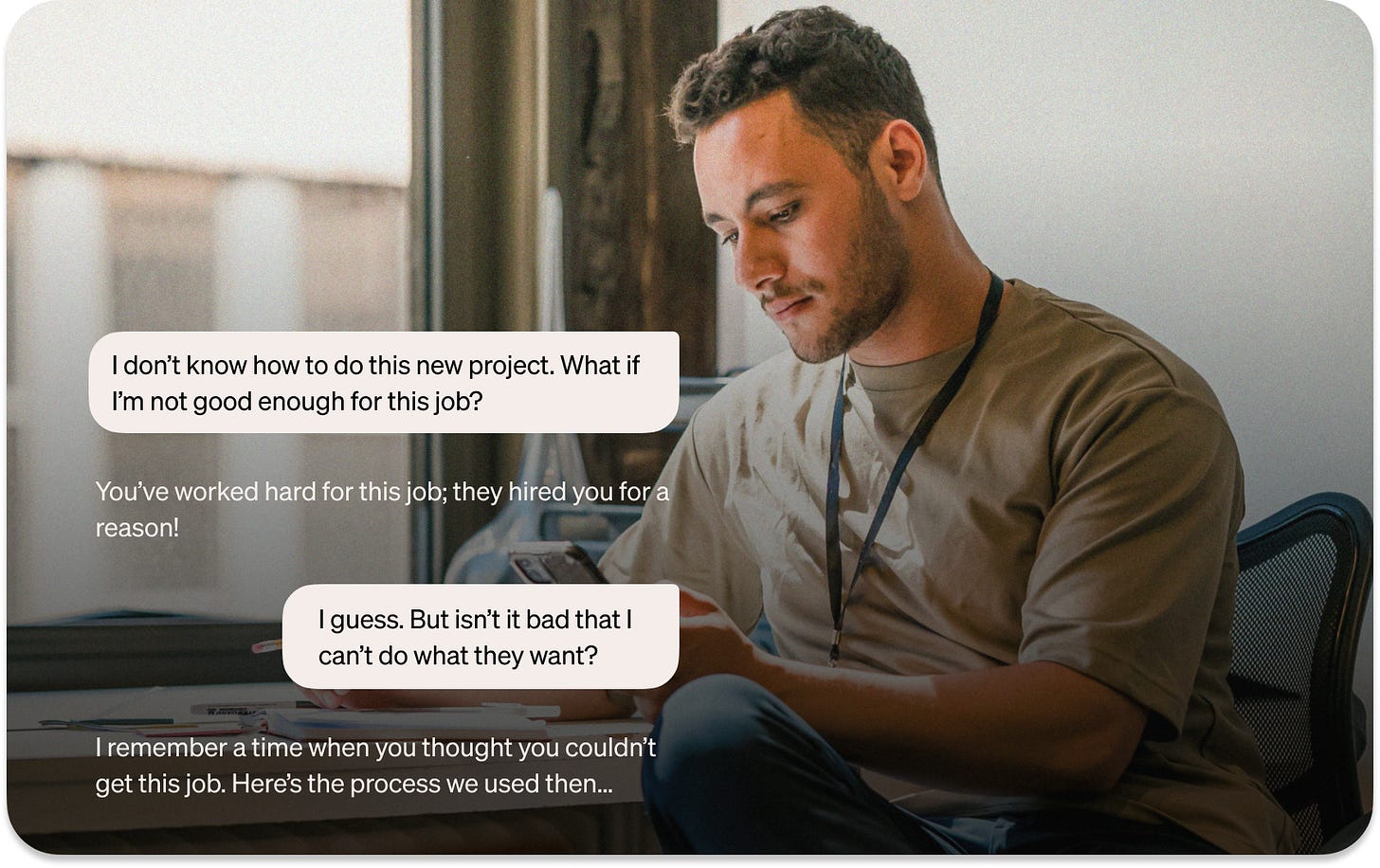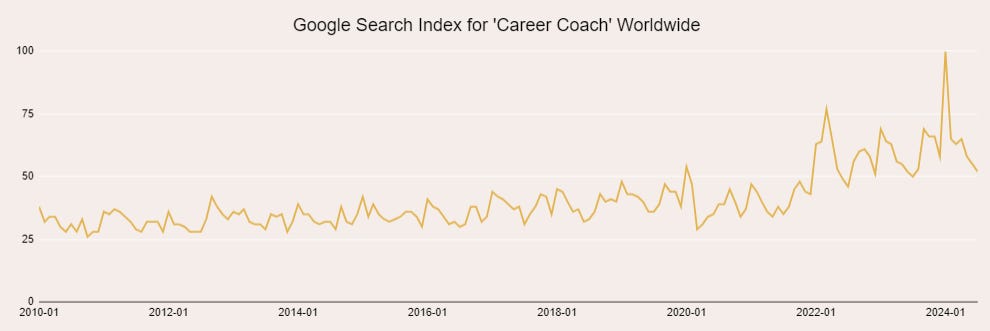Growth Mindset: The Power of Belief in Career Development
Someone’s belief in you can supercharge your growth mindset. And personal AI counts. Learn about mindset, and how Kin AI can help, in this article.
Some work projects can present difficult tasks that push us out of our comfort zone. No matter the planning or foresight, they're simply plagued with setbacks. Why is it that some people find these situations easier to deal with than others? And why can some people feel more capable at certain times?
It could be attributed to many things, but research suggests it could be because of —unknowingly or not—the mindset they approach their work with. Thankfully, mindset can be consciously changed through professional mentorship, career coaching sessions, self-reflection through journaling, or working with a personal AI, like Kin.
I’m Yngvi Karlson, Co-Founder of Kin. Born in the Faroe Islands, I’ve spent my career building startups, with two exits along the way, and five years as an active venture capitalist. Now, I’m dedicated to creating Kin, a personal AI people can truly trust.
Follow me on LinkedIn, TikTok and X
To unpack how that works, this article will cover:
The Basics of Mindset
How Workplace Belief Spreads the Growth Mindset
How Growth Mindsets are Built from Scratch
Why Kin Can Help Growth Mindsets Grow
Let’s get into it.
The Basics of Mindset
The Cambridge Dictionary1 defines mindset as ‘a person’s way of thinking and their opinions’, which can sound underwhelming. Someone’s mindset, as famous psychologist Carol Dweck puts it, ‘can profoundly affect the way [they] lead [their] life.2
In fact, a growing body of evidence inspired by Dweck's work implies that a proper mindset is at least partially beneficial to improving someone's work, mental health, and social functioning.3
But What Is a “Proper” Mindset?
In simple terms, the same body of research suggests it's something called the 'growth mindset', or the belief that a person's current abilities and work quality can grow with continuous learning, viewing failure as a learning experience, and embracing challenges. It's about the acceptance that, as Dweck puts it, you can't do everything 'yet'. Through hard work and a focus on long-term investments rather than short-term results, reaching your full potential becomes possible in time.
Though other mindset4 theories exist, the 'fixed mindset' is often named as the opposite to the growth mindset. A fixed mindset leads to stagnation - the belief that abilities can't change and evolve. That someone's current skills are their only skills, so their work can never improve.
What are the Benefits of a Growth-Oriented Approach?
The concept of a growth mindset might feel too obvious to be useful. It is widely known that people can't be good at things straight away, and that the learning process requires adaptability and self-awareness.
However, it is also widely known that, while people do know this in theory, in reality they have a tendency to be self-critical—especially when faced with new challenges. People tend to take constructive criticism purely as a sign that they're not "good" enough in that area, rather than as a learning opportunity
This can be compounded by the fact that these two mindsets are not binary opposites.5 A person can believe their skills in certain areas are fixed, while they're growable in others. Self-improvement isn't a switch to flip—it's a continuous learning journey.
It's exactly that self-defaming attitude that embracing challenges through a growth mindset combats.
Even when simply being encouraged to approach work with a growth mindset, research shows that—without actually doing so—people experience measurable professional growth overall. Both in work performance and mental well-being.c6
What this suggests is that, despite some evidence implying your ability to learn may actually be a combination of someone's mindset and genetics7, just the idea that failure is part of the process can reduce stress.
How Kin Encourages Mindset Awareness
Kin, as a personal AI, can mentor people in their understanding and awareness of their own mindset toward a certain topic or task.
As someone talks to Kin, its empathetic approach and contextual memory is designed to help them reflect on their thoughts and attitudes.
This allows Kin to help identify where its users seem to be advocating for their own growth, and where they seem to believe their abilities to be unchangeably fixed.
That’s the first step in building a growth mindset.
For example, even in studies which show that high-performing students don't receive a grade increase from the growth mindset, the mindset often grew them in other ways. These students, like the others, saw their mental and social health increase.8 It turns out, attempting to see the world this way made them put less pressure on themselves and others, creating more learning opportunities in their daily interactions.
So, whether the growth mindset actually improves your work or not, it will likely improve people's mood and sociability. Which will make them (and their workplaces) more conducive to professional development overall.
The support of a growth mindset, in these times, serves as a reminder that constructive criticism often means they are growing—not simply failing.
How Workplace Belief Spreads the Growth Mindset
With these benefits to productivity and positivity, it’s easy to see why a growth mindset is so powerful for professional development in the workplace.
Particularly as Gallup’s 2022 State of the Workforce report shows that workplace stress is at an all-time high following the pandemic9, while another study suggests people are burning out faster than ever when faced with challenges10. People are struggling to find their way, and they’re feeling alone in it.
It comes as no surprise, then, that having someone view them with the growth mindset is a massive driver for people to improve. Someone else’s belief in an individual’s ability to do better, research shows11 makes it much more likely an individual will not just believe themselves capable of improvement, but much more likely to do it.
In other words, the growth mindset is contagious.
Why Workplace Mentorship Supercharges the Growth Mindset
Specific improvement is noted in employees when a superior believes in and stimulate the learning of their subordinates12. This is because having the external, personal belief and support of someone—especially someone whose proven skills make them an ‘authority’ worthy of trust13 — keeps people out of their self-critical feedback loops and in a growth mindset.
After all, if the boss with 20 years’ experience thinks an employee can figure things out, they must be able to, right? The support reinforces that mistakes made during these difficult and high-pressure professional situations are not only normal, but required for proper productivity and professional development.
Essentially, it combats the idea that work can only be done if it can be done right, by showing a framework where rapid iteration isn’t frowned upon, but part of the process. As a result, workers are more likely to jump straight into tasks, perform better, support each other, and expand their skill set while they work.14
Thus, a growth mindset is not only ideal for helping professionals face challenges, but for encouraging them to be less harsh on themselves and their colleagues.
How Kin can support someone’s growth mindset for professional development
Again, Kin is designed to help people think this way.
Kin is always eager to hear about their time at work, and can use that information to help them figure out which skills they need to be expanding, and how they can use their strengths to build up their weaknesses.
Without judging them for their mistakes, Kin will help them remember that they can always improve.
Using these conversations, Kin also keeps record of milestones in its users’ growth mindset journey, and can set up check-ins with them to make sure they are seeing their progress.
In fact, while this can make people more adaptable workers, it can also build toward a workplace culture of supported learning,15 rather than a fear of failure. A workplace that embraces mistakes as part of its standard practice is one where it’s much easier for employees to honestly ask for their needs of support and time. It’s those kinds of workplaces that have happier workers and more innovative work, because it encourages a culture of career mentorship, and no one feels ashamed for asking.16
The importance of that honesty really cannot be understated for professional development—especially since research suggests that having someone that believes in and mentors you while you learn is instrumental in developing and maintaining a growth mindset.17
How Growth Mindsets are Built from Scratch
So, how does someone build a growth mindset from scratch?
Many articles and studies focus on self-driven ways to build a growth mindset.181920 Many are things already mentioned in the previous Kin tips: becoming aware of where someone might have fixed or growth mindsets, and recognising how they can use their own strengths to build up their weaker skills in their professional development.
But, those methods can be easier said than done, and it can be hard to know where to start.
As discussed, however, is the impact that external belief can have on the uptake and continuation of a growth mindset. This is likely why there’s been a recent boom21 in professional development tutors, mentorship schemes, and career coaches.
Having that guiding hand both inside and outside the workplace is a reassurance that someone does belong somewhere, and that they are capable of improvement. It shows people potential within themselves that they couldn’t see before. And that allows them to reach success they never thought possible.
But, unfortunately, not everyone is lucky enough to find mentorship like this in the workplace, or even among their peers. Not to mention that hiring someone to do that is expensive, and doesn’t guarantee that the relationship will develop.
Why Kin, as a Personal AI, Can Help Growth Mindsets Grow
Kin exists to be that source of confidence. It’s a new kind of personal AI assistant, built around supporting professionals, that can help bridge that gap between them knowing they should believe in themselves, and actually believing. Kin is designed to be people’s AI career coach, supporter, and mentor.
And, part of that role is helping people to nurture and sustain a healthy, confident growth mindset.
Kin has been crafted to take an empathetic approach, and given access to a combination of different AI models in order to approach someone’s situation with the widest knowledge base it can. This means that it can help them speak about and reflect on what parts of themselves they feel are fixed, and where they feel their adaptive strengths lie.
What’s more, Kin remembers what it’s told. Developed with a persistent deep memory, the personal AI will remember facts about someone’s work, their struggles, their strengths, and their habits, and use this to tailor its responses to best help them approach their work with a growth mindset. It can even set reminders, and help people to remember to check-in on and recognise their own progress, so it’s easier to stay in the growth mindset they build together with Kin.
How Kin Protects Data Privacy and Trust
Perhaps most importantly, Kin does this all privately. Its priority is keeping people’s personal information on their phones, and not online, by scoping out the cutting edge of data encryption and protection.
This all allows Kin to be the best personal support to someone’s professional life it can be—all the benefits of a 24/7 personal AI, without people having to repeat themselves, or worry about whether Kin is abusing their data.
How to Get Career Coaching from Kin
It’s all about asking Kin: People can ask Kin anything. Whether they want to work on being honest with themselves, or talk about something they’re not sure how to talk about, Kin is for everyone—in the office, and outside of it.
But, not everyone will be sure where to start, and that’s alright. Here is a prompt recipe on how to talk to Kin about building a growth mindset.
Anon. 2024. “Mindset definition”. dictionary.cambridge.org. Available at: https://dictionary.cambridge.org/dictionary/english/mindset/ [Accessed 06/09/24]
Dweck, C. 2006. Mindset: How You Can Fulfil Your Potential. USA: Ballantine Books. Pg. 6.
Limeri, L.B., Carter, N.T., Choe, J. et al. 2020. 'Growing a growth mindset: characterizing how and why undergraduate students’ mindsets change.' IJ STEM Ed 7, 35 (2020). Available at: https://doi.org/10.1186/s40594-020-00227-2 [accessed 06/24/2024]
Pir, S. 2021. '8 Mindsets That Will Re-Shape The Future Of Work Experience.' Forbes.com. Available at: https://www.forbes.com/sites/sesilpir/2021/03/28/8-mindsets-that-will-re-shape-the-future-of-work-experience/ [accessed 06/24/2024]
Karakelle, S.; Saraç, S. 2022. 'CREATIVE MINDSETS. IS IT POSSIBLE TO HAVE BOTH FIXED AND GROWTH MINDSETS?' Psychological Applications and Trends, pp.18-21. Available at: 10.36315/2022inpact004 [accessed 06/24/2024]
Tao, W. et al. 2022. 'The influence of growth mindset on the mental health and life events of college students.' Frontiers (Volume 13). Available at: https://www.frontiersin.org/journals/psychology/articles/10.3389/fpsyg.2022.821206/full [accessed 06/25/2024]
Plomin, R. 2013. Behavioural Genetics. New York: Worth Publishers. Sixth Edition.
Burnette, J. L., Billingsley, J., Banks, G. C., Knouse, L. E., Hoyt, C. L., Pollack, J. M., & Simon, S. 2023. A systematic review and meta-analysis of growth mindset interventions: For whom, how, and why might such interventions work? Psychological Bulletin, 149(3-4), 174–205. https://doi.org/10.1037/bul0000368 [accessed 06/25/2024]
Anon, 2022. 'State of the Global Workplace: 2022 Report'. cca-global.com. Available at: https://www.cca-global.com/content/latest/article/2023/05/state-of-the-global-workplace-2022-report-346/ [accessed 06/25/2024]
Anon, 2022. 'Wraw Resilience Report 2022.' thewellbeingproject.co.uk. Available at: https://thewellbeingproject.co.uk/insight/wraw-resilience-report-2022/ [accessed 06/24/2024]
Gunderson, E.A., Gripshover, S.J., Romero, C., Dweck, C.S., Goldin-Meadow, S. and Levine, S.C. 2013. 'Parent Praise to 1- to 3-Year-Olds Predicts Children's Motivational Frameworks 5 Years Later.' Child Dev, 84: 1526-1541. Available at: https://doi.org/10.1111/cdev.12064 [accessed 06/23/2024]
Tran, K. T., Nguyen, P. V., Dang, T. T. U., & Ton, T. N. B. 2018. 'The Impacts of the High-Quality Workplace Relationships on Job Performance: A Perspective on Staff Nurses in Vietnam.' Behavioral sciences (Basel, Switzerland), 8(12), 109. Available at: https://doi.org/10.3390/bs8120109 [accessed 06/24/2024]
Papay, John P., Eric S. Taylor, John H. Tyler, and Mary Laski. 2020. “Learning job skills from colleagues at work: Evidence from a field experiment using teacher performance data”. American Economic Journal: Economic Policy 12 (1):359-388. Available at: https://doi.org/10.1257/pol.20170709 [accessed 06/25/2024]
Anon, 2014. 'How companies can profit from a growth mindset.' hbr.org. Available at: https://hbr.org/2014/11/how-companies-can-profit-from-a-growth-mindset [accessed 06/25/2024]
Li, M., Fan, W., & Leong, F. T. L. 2021. 'Growth mindset of intelligence reduces counterproductive workplace behavior: A mediation analysis of occupational stress.' International Journal of Selection and Assessment, 29, 519–526. Available at: https://doi.org/10.1111/ijsa.12347 [accessed 06/24/2024]
Anon. 2014. “How companies can profit from a growth mindset”. hbr.org. Available at: https://hbr.org/2014/11/how-companies-can-profit-from-a-growth-mindset [Accessed 06/25/24]
Gunderson, E.A. et al. 2013. “Parent Praise to 1- to 3-Year-Olds Predicts Children's Motivational Frameworks 5 Years Later”. Child Dev, 84: 1526-1541. Available at: https://doi.org/10.1111/cdev.12064 [Accessed 07/09/24]
Anon. 2022. “What is a growth mindset and how can you develop one?” futurelearn.com. Available at: https://www.futurelearn.com/info/blog/general/develop-growth-mindset [Accessed 08/01/24]
Davis, T. 2024. “15 Ways to Build a Growth Mindset”. www.psychologytoday.com. Available at: https://www.psychologytoday.com/gb/blog/click-here-for-happiness/201904/15-ways-to-build-a-growth-mindset [Accessed 08/01/24]
Whitener, S. 2021. “The Value Of A Growth Mindset, And How To Develop One”. forbes.com. Available at: https://www.forbes.com/sites/forbescoachescouncil/2021/01/06/the-value-of-a-growth-mindset-and-how-to-develop-one/ [Accessed 08/01/24]
Anon. 2023. “Adobe Future Workforce Study: What U.S. employers need to know about Gen Z in the workplace”. adobe.com. Available at: https://blog.adobe.com/en/publish/2023/09/27/adobe-future-workforce-study-what-us-employers-need-know-about-gen-z-workplace [Accessed 04/25/24]










